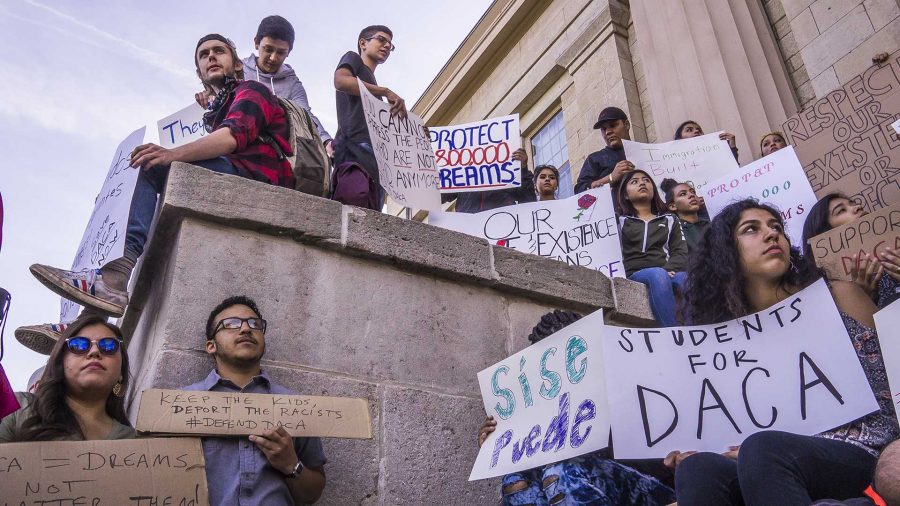The protesters gathered on the Pentacrest on Thursday evening to support those affected by Trump’s DACA ban.
By Molly Hunter
Hundreds of students, faculty, and community members gathered on the Pentacrest on Thursday evening to protest the Trump administration’s withdrawal of the Deferred Action for Childhood Arrivals immigration policy.
Diane Crosby, a UI academic adviser at the who attended Thursday’s protest, said she supports DACA because it’s humane.
“[DACA] allows people who were innocent when they came here to find their way,” Crosby said. “Instead of abolishing it, we should have a road to citizenship.”
Crosby said the young people affected by DACA offer a lot to the U.S.
“They are a treasure. They are not something wrong,” she said. “We need to support these people, students, their families, and find an opportunity and a way to citizenship.”
Ally Perko, a UI graduate student studying music therapy, said she hopes the people affected by the DACA decision get the chance to live the same way U.S. citizens do.
“The decision to rescind DACA is a bad one,” said Autumn Tallman, a UI freshman from Des Moines. “The people that are being affected by that decision deserve to be here just as much as everyone else does.”
Tallman said she attended the protest to stand in solidarity with those affected by DACA’s withdrawal.
“Hopefully, if enough of these protests happen across the country, our legislators will see it, and the people responsible for making these decisions will see this and realize … something needs to change.”
RELATED: UI community ‘stands in solidarity’ with DACA students
Tallman and those close to her won’t be affected by DACA’s withdrawal, but she said that’s why it’s especially important for her to attend the protest.
“If you’re thinking big picture, there are so many people that are going to hurt from this decision, and you should care about those people, too,” Tallman said. “You shouldn’t only care about the people you know.”
Carla Gonzalez, a graduate student studying leadership policy studies, said today’s legal issues have been constructed as part of a political agenda.
“The Dreamers that are here now [came] as young children. [They] know no other culture,” Gonzalez said. “They could be told that they’re undocumented and not know their entire life.”
Gonzalez is a fourth-generation Mexican American whose family came to Illinois in the 1800s. She said she doesn’t feel very separated from the families whose children are affected by DACA.
“I don’t see the difference between myself and why those families came other than … the luck of time,” she said.
Tallman said she wants any undocumented UI students previously protected under DACA to know they’re appreciated.
“I hope they can see from how many people are showing up here that there are a lot of people that go to this school that support them and are glad they’re here, and we hope they can stay here,” she said.
Crosby said she would want those affected by DACA’s withdrawal to know people are working to find a way to treat them with the humanity they deserve.
“Don’t panic. We’re here for you,” she said. “No one’s going to come and get you tomorrow. The law clinic is going to help you. You have a right to appeal, and we have your back. This takes time. Stay strong.”



